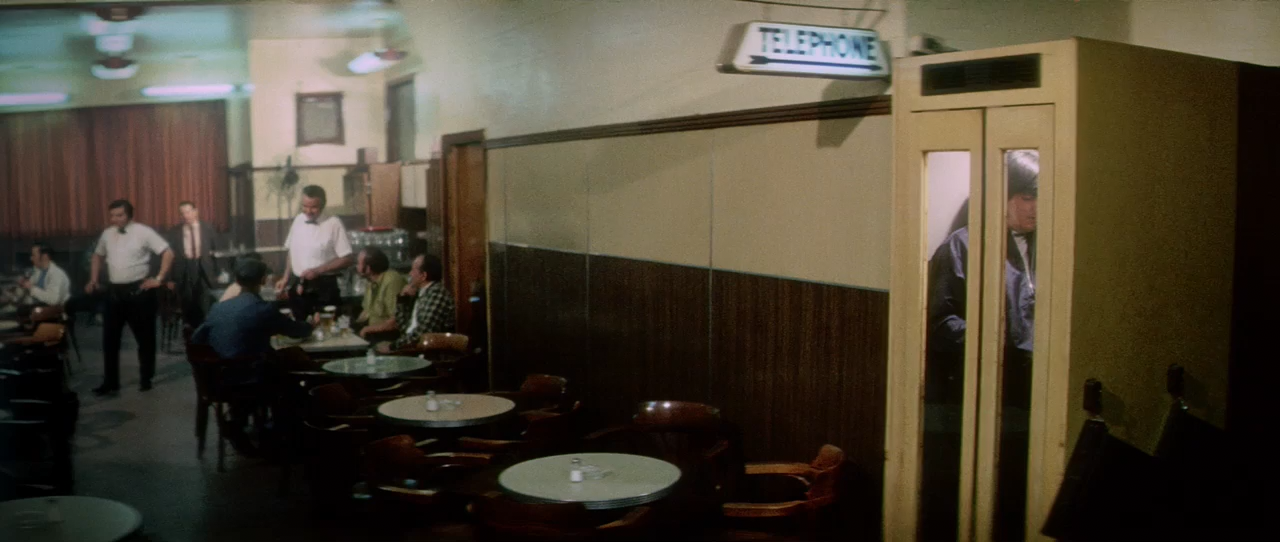La horse [Horse] (Pierre Granier-Deferre, 1970)
Aug
23
baguette

Auguste Maroilleur (Jean Gabin) at the head of a long table, covered in Good Things (wine, butter, coffee, and fresh milk). He cuts a baguette with his pocketknife. DP: Walter Wottitz.
1970s
La maudite galette [Dirty Money] (Denys Arcand, 1972)
Aug
2

At a depressing, fluorescent-lit bar, men gathered at small round tables smoke and drink. A single man in a brightly lit phone booth places a call. DP: Alain Dostie.
Wieczne pretensje [Permanent Objections] (Grzegorz Królikiewicz, 1975)
Jul
29
kotlet mielony

Two men in suits in what appears to be a factory canteen. One offers the other a large piece of kotlet mielony or kotlet schabowy, a type of #schnitzel. DP: Bogdan Dziworski.
Na wylot [Through and Through] (Grzegorz Królikiewicz, 1972)
Jul
15
sandwiches

Jan (Franciszek Trzeciak) and Maria (Anna Nieborowska) share lunch on a bench. DP: Bogdan Dziworski.
狼やくざ 殺しは俺がやる [Ōkami yakuza: Koroshi wa ore ga yaru / Yakuza Wolf: I Perform Murder / The Lone Assassin] (Ryūichi Takamori, 1972)
Jul
13
lollipops

One of the gang members, immaculately dressed in all-black and small like a child, walks along a seedy street holding an oversized rainbow lollipop. DP: Yoshio Nakajima.
The Disappearance (Stuart Cooper, 1977)
Jun
21
cereal

Jay Mallory (Donald Sutherland) eats cornflakes in a black-tiled kitchen in Habitat 67. At the other side of their hexagonal table, Celandine (Francine Racette) smokes a cigarette. DP: John Alcott.
“I think it's really rotten of them to lock you up like this for making love to a boy.”Die Konsequenz [The Consequence] (Wolfgang Petersen, 1977)
Jun
17
prison grub

Thomas (Ernst Hannawald), the warden's son, and convicted homosexual Martin (Jürgen Prochnow) sharing a mug, a meal, a cell. DP: Jörg-Michael Baldenius.
– Thomas Manzoni
鴎よ、きらめく海を見たか めぐり逢い [Kamome-yo, kirameku umi o mitaka/meguri ai / Oh Seagull, Have You Seen the Sparkling Ocean? An Encounter] (Kenji Yoshida, 1975)
May
30
Pokkī

A young woman in a red-and-white striped sweater (Yōko Takahashi) leafs through fashion magazines strewn out before her on a grass-green carpeted floor while chewing a Pokkī. On a small stove close to her a fire truck red coffee pot. DP: Kōshirō Ōtsu.
“One grilled cheese, two slices of toast, two coffees. One pepper steak no chili and a plate of spaghetti and meatballs. Two glasses of milk. One plate of spare ribs. A chicken in a basket with three cups of honey. One lean smoked meat sandwich with pickles and mustard. One two-cream coffee and two club sandwiches. Two clubs.”Françoise Durocher, Waitress (André Brassard, 1972)
May
21
lunch break

Waitress Françoise Durocher, this may be Luce Guilbeault, on her lunch break. DP: Thomas Vámos.
– Françoise Durocher
The Shout (Jerzy Skolimowski, 1978)
May
1
mutton

Charles Crossley (Alan Bates) in Anthony Fielding's (John Hurt) kitchen. Despite being the outsider here, Crossley's presence takes central stage. DP: Mike Molloy.